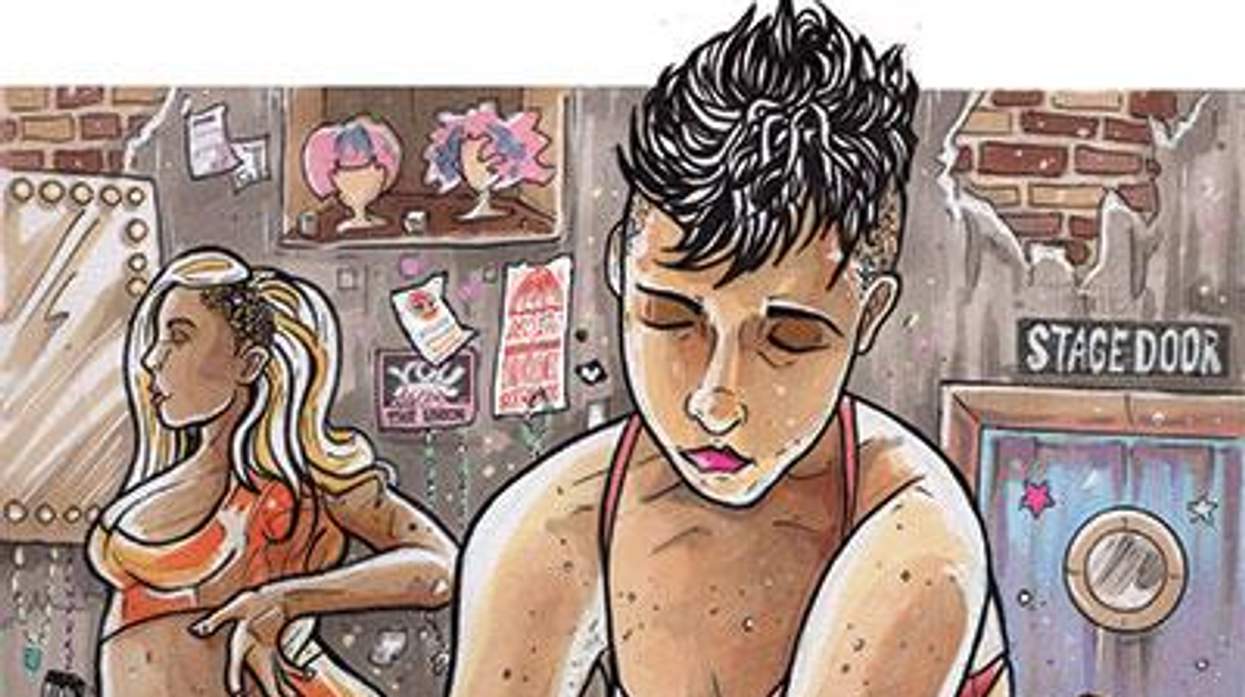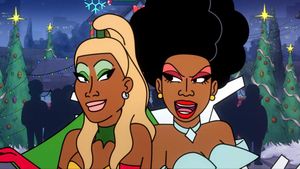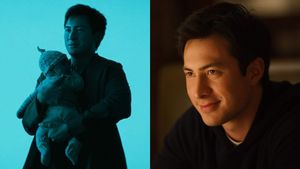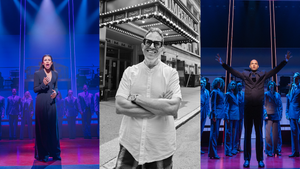When I was 8 years old, my mother got divorced from Bob Number 1. (There were three Bobs in succession; my father was her only non-Bob husband, and they divorced when I was 2.) It was the 1970s, and my mother and I moved into an apartment complex a few doors down from my aunt Sam, in East Los Angeles. My aunt Sam's real name was Gladys, but nobody called her anything but Sam. Sam was a sex worker. Not a thousand-dollar-a-call-out escort, but a poor, plain working woman, out on her own as a young street walker. She used drugs, she went to jail for prostitution, and she was the black sheep in a family of black sheep. She was bisexual and seemed in charge of her own life. She'd been in prison for prostitution, and by the time I knew her she was dying of cervical cancer, the result of HPV transmission from one of her clients.
What sounds like a bleak life didn't seem so sad to me. My aunt Sam was the only financially independent woman I knew. My mother couldn't manage life without a man, but even though Sam had a boyfriend, it was clear she could take care of herself. I admired her, and before I had any other role models, before I fell in love with the printed word, I had often imagined I'd become a sex worker too. In sixth grade, I had a plan to run away, live like the chick in the '80s movie Angel, a teenage honor student by day but a miniskirted street walker working Hollywood and Vine at night. I had a plan, but life intervened. Within months my aunt was dead and I was living in Idaho with my father's white, middle-class family, and I never had to fulfill that childhood plan.
But still, a decade later, I found myself in sex work of a different kind: what I thought of as lesbian sexual liberation and others thought of as porn.
The first day I showed up to my new job at On Our Backs in 1993, it dawned on me that I was officially doing sex work. I mean, I knew that On Our Backs, the first lesbian erotic magazine, which was started in 1984 by a sex-positive butch-femme couple, Debi Sundahl (who helped raise money to start the magazine by stripping) and her partner Nan Kinney, featured photos of naked women and lesbian couples and reviews of sex products. I knew the company, under the auspices of Blush Entertainment, sold the only real for-lesbians-by-lesbians adult films on the market (like the classic Suburban Dykes). The magazine, started at the peak of the sex wars, had a list of contributors that included many of my idols, including Dorothy Allison, Joan Nestle, Patrick Califia, and Susie Bright.
When I arrived at the office, there were life-size posters of women having sex -- blow-ups from the magazines and the videos -- and the realization hit me while looking at the sparse staff in the room that the photos included women I would be working with. It may be hard for some to imagine working with a colleague whose pierced labia is hung on the wall, but to me, this was a queer woman's sexual revolution taking place.

Sex work as a means of support is centuries old, and LGBT men and women have both been well represented. Male sex workers are on record as early as 346 B.C. in Greece. In the 19th century sex workers and lesbians, both socially marginalized groups, banded together as the world began to pathologize them as sexual deviants. (Leslie Feinberg's
Stone Butch Blues illustrates the strong relationship between femme lesbian sex workers and stone butches -- or reading between the lines:
transgender men.)
Gay culture has a long history of sex work, from 1950s "hustle" bars where "straight" guys paid a commission to the bartender in order to hook up with gay johns, to 1990s go-go bars where queer dancers were often there to display their wares to potential clients, either as porn actors or other types of sex workers. Dozens of gay icons from Andy Warhol to Christopher Isherwood and Samuel Delany have admitted to (and boasted about) picking up hustlers, and John Rechy's 1963 book City of Night -- his story of working as what they used to call "straight trade" for gay clients -- is a bona fide gay classic.
In the 1970s, gay liberation included gay men having sex with gay hustlers, and as Kerwin Kaye writes in the new book Male Sex Work and Society, "The shifts in male prostitution associated with gay liberation led to a significant reworking of the meanings associated with prostitution...for the first time it became a possible means of affirming one's sexual identity. Indeed, for a brief time, the gay-identified prostitute came to represent the new spirit of gay liberation."
Amber Hollibaugh, the award-winning lesbian filmmaker, journalist, and activist, was quoted in Svati P. Shah's academic essay "Sex Work and Queer Politics in Three Acts," calling sex work her act of radical liberation as well. "People configured their lives in a way that allowed them economic survival, and if you wanted a radical life, you had to configure a life that was unstructured, because you couldn't go to a nine-to-five job and go to a demonstration during the day. It just didn't configure...I didn't do sex work because I wanted to have nontraditional work hours...I didn't have other employment choices that were at all acceptable. I mean they were just miserable...The job that worked the best for me, when I could make it work well, was sex work or something in the sex trade."

Gay literature celebrated sex work in the '80s and '90s, and even today books like R. Talent's anthology
Pay for Play: Men Paying Men for Sexual Favors (Bold Strokes) become gay best sellers. Plenty of gay men have written memoirs of their sex work, including Craig Seymour's
All I Could Bare: My Life in the Strip Clubs of Gay Washington, D.C. (Atria) and Rich Merritt's "don't ask, don't tell"-era
Secrets of a Gay Marine Porn Star (Kensington). Queer women too are celebrated in sex-work literature. The venerable
$pread magazine, an indie sex-worker magazine edited largely by lesbian and bisexual women, is now defunct, but we're reminded of its 2000-era impact in the new collection,
$pread: The Best of the Magazine That Illuminated The Sex Industry and Started a Media Revolution.
Trans women have fought hard to be portrayed on television and film as anything other than sex workers or victims, but sadly that makes it so we often don't talk about the extraordinarily high rates of sex work trans women are forced into for economic security and to pay for medical care, especially when it's nearly impossible to get a job during transition.
A disproportionate number of trans and queer youth end up homeless, which means many of us have done sex work for survival, sometimes as basic as trading sex for a place to sleep -- informal arrangements that they may not have even considered sex work, but it is.
Right now there's a fight in Chelsea, a gay neighborhood in New York. The fifth gay sex shop opened up earlier this year within a five-block stretch of Eighth Avenue. Guess who wants them shut down? Gay parents. Gay men who probably once patronized those stores in their 20s are now wanting them shut down for the sake of the children. It's a chilling indictment of what many LGBT folks think of sex work. At a time when we should be decriminalizing sex work, there's a movement in the LGBT world to pretend sex work doesn't exist, isn't a queer and trans issue, isn't something we've historically embraced.
But back in 1993, there I was, working at a lesbian sex magazine. And loving it. The thing I realized then is that the LGBT world has a long history of sex work, only now there seems to be a divide in the community, half of us proud of its history and the role sexual liberation played in our early rights movement. The other half want it all squelched.

During my time at
On Our Backs, I knew a ton of queer sex workers. Girls who would strip at the Lusty Lady at night, guys who advertised themselves in magazines (including
The Advocate, once a premium place for sex ads) as escorts or erotic massage therapists. In fact, as LGBT media evolved, those sex ads blossomed, filling the pages and paying the bills until many -- including this one -- purged their pages of sexual content in a late-1980s bid for mainstream advertising.
But that's our history, and fighting it or covering it up so we can have marriage equality is a tough price to pay for the LGBT folks who are still doing sex work, either by choice or coercion. We create a world where those folks are marginalized, isolated, invisible -- and much more at risk for HIV, not just because they are having multiple sex partners but also because they are criminalized for carrying condoms, their clients know they can be violent with impunity because police don't take sex-worker assault seriously, and since sex work is illegal it forces those men and women into unsafe territory to do their business.
Over 50 countries have decriminalized sex work, making it safer for the folks who do it. At a time when millions in this country are getting their sex information from schlock like 50 Shades of Grey, it's not a surprise that straight, cisgender people don't get why that's important. But LGBT people really should. It's our cultural history. It's time the LGBT community get behind legalization of sex work and embrace rather than distance ourselves from the unique role LGBT people have historically played in the sex industry. Legalization actually makes a safer world for the women and men who do sex work, and it destigmatizes something as old as time. Yes, especially now, in this new age of marriage equality and post-gay parenting and our happy white-picket-fence lives, there's a need for us to stand up for the least-protected class of people, LGBT sex workers, and demand their rights now, too.


 Sex work as a means of support is centuries old, and LGBT men and women have both been well represented. Male sex workers are on record as early as 346 B.C. in Greece. In the 19th century sex workers and lesbians, both socially marginalized groups, banded together as the world began to pathologize them as sexual deviants. (Leslie Feinberg's Stone Butch Blues illustrates the strong relationship between femme lesbian sex workers and stone butches -- or reading between the lines:
Sex work as a means of support is centuries old, and LGBT men and women have both been well represented. Male sex workers are on record as early as 346 B.C. in Greece. In the 19th century sex workers and lesbians, both socially marginalized groups, banded together as the world began to pathologize them as sexual deviants. (Leslie Feinberg's Stone Butch Blues illustrates the strong relationship between femme lesbian sex workers and stone butches -- or reading between the lines:  Gay literature celebrated sex work in the '80s and '90s, and even today books like R. Talent's anthology Pay for Play: Men Paying Men for Sexual Favors (Bold Strokes) become gay best sellers. Plenty of gay men have written memoirs of their sex work, including Craig Seymour's All I Could Bare: My Life in the Strip Clubs of Gay Washington, D.C. (Atria) and Rich Merritt's "don't ask, don't tell"-era Secrets of a Gay Marine Porn Star (Kensington). Queer women too are celebrated in sex-work literature. The venerable $pread magazine, an indie sex-worker magazine edited largely by lesbian and bisexual women, is now defunct, but we're reminded of its 2000-era impact in the new collection, $pread: The Best of the Magazine That Illuminated The Sex Industry and Started a Media Revolution.
Gay literature celebrated sex work in the '80s and '90s, and even today books like R. Talent's anthology Pay for Play: Men Paying Men for Sexual Favors (Bold Strokes) become gay best sellers. Plenty of gay men have written memoirs of their sex work, including Craig Seymour's All I Could Bare: My Life in the Strip Clubs of Gay Washington, D.C. (Atria) and Rich Merritt's "don't ask, don't tell"-era Secrets of a Gay Marine Porn Star (Kensington). Queer women too are celebrated in sex-work literature. The venerable $pread magazine, an indie sex-worker magazine edited largely by lesbian and bisexual women, is now defunct, but we're reminded of its 2000-era impact in the new collection, $pread: The Best of the Magazine That Illuminated The Sex Industry and Started a Media Revolution. During my time at On Our Backs, I knew a ton of queer sex workers. Girls who would strip at the Lusty Lady at night, guys who advertised themselves in magazines (including The Advocate, once a premium place for sex ads) as escorts or erotic massage therapists. In fact, as LGBT media evolved, those sex ads blossomed, filling the pages and paying the bills until many -- including this one -- purged their pages of sexual content in a late-1980s bid for mainstream advertising.
During my time at On Our Backs, I knew a ton of queer sex workers. Girls who would strip at the Lusty Lady at night, guys who advertised themselves in magazines (including The Advocate, once a premium place for sex ads) as escorts or erotic massage therapists. In fact, as LGBT media evolved, those sex ads blossomed, filling the pages and paying the bills until many -- including this one -- purged their pages of sexual content in a late-1980s bid for mainstream advertising.


































































Charlie Kirk DID say stoning gay people was the 'perfect law' — and these other heinous quotes